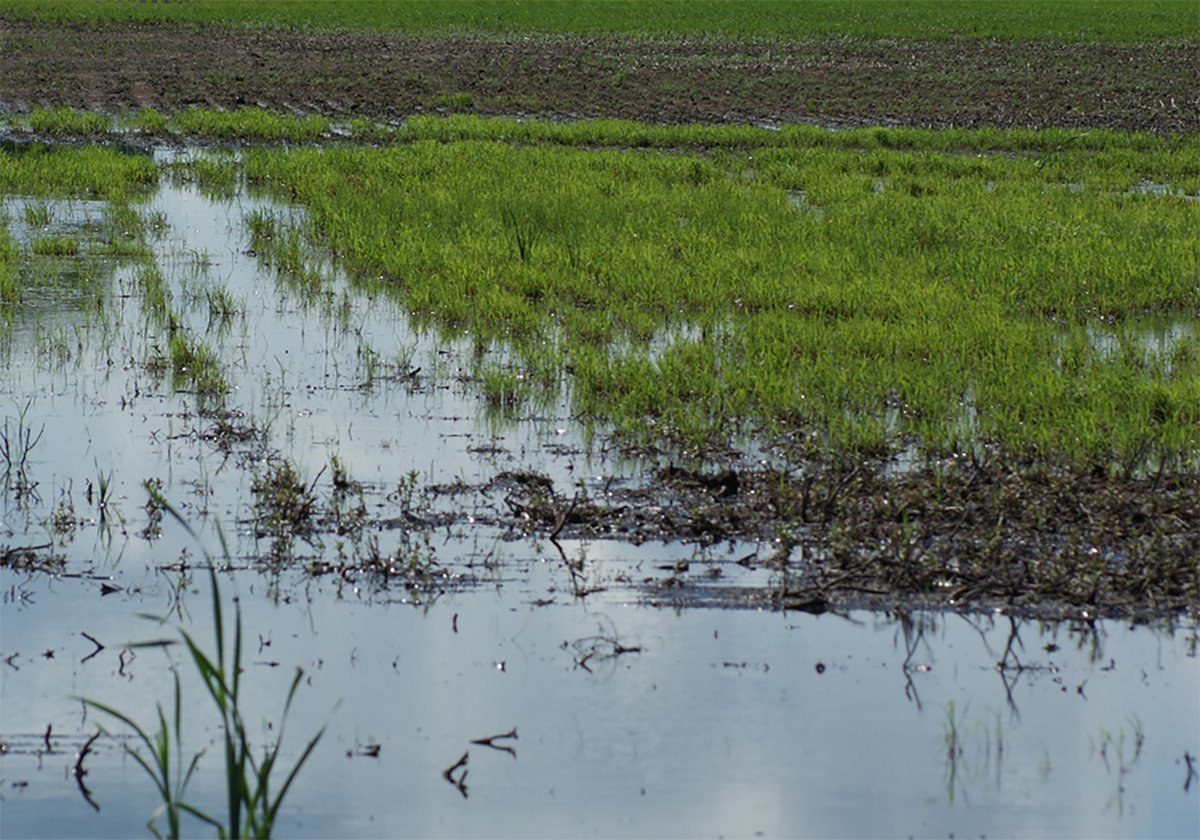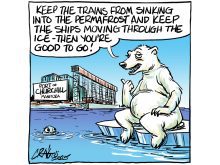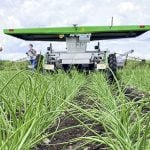Special edition
Your Special Edition – “Innovators in Agriculture” … Dec. 27, 2007, was very well done. Congratulations.
The stories featuring so many innovators and promoters brought back many memories.
I was especially pleased to see Tom and Emmy Droog of Bow Island featured. They are true innovators and entrepreneurs. They have contributed a great deal to the betterment of the Bow Island area.
– Fred Mellen,
Bow Island, Alta.
Latimer support
As I read the letters of support for Robert Latimer, I also agree with the readers that the decision by the National Parole Board to keep Mr. Latimer behind bars indefinitely was not necessary.
Read Also

Topsy-turvy precipitation this year challenges crop predictions
Rainfall can vary dramatically over a short distance. Precipitation maps can’t catch all the deviations, but they do provide a broad perspective.
Most people would agree that he is no threat to society.
I believe he has suffered enough; first with going through the pain his daughter suffered and now the years he has already spent behind bars.
I would hope the NPB gives him another chance at parole.
I would think there is a huge difference between a cold-blooded killer and parent that could not take the constant pain of a loved one, for 12 years, with no hope of ever getting better.
Yet in my local city paper we learn of dangerous offenders being released every week and some do not return when scheduled to.
I would also add my name to the 2001 petition of support for Mr. Latimer.
– Stephen H. Warunki,
Bon Accord, Alta.
Murder is murder
Re: Latimer travesty; letter by Audrey Jensen (Open Forum, Jan. 17.)
Audrey Jensen contradicts herself by disapproving of Robert Latimer’s murder charge in the killing of his severely handicapped daughter while still referring to it as murder. Thankfully, there is no allowance for mercy killing in the criminal code; it’s called murder.
Your reference to Colin Thatcher, a convicted murderer, being let out on day parole doesn’t make the case for Latimer’s release any stronger since no murderer deserves early parole.
As a parent of a handicapped child, I can appreciate some of the difficulties we go through as families. However, murder is never a way to display love to our children.
– Casey Guliker,
Chilliwack, B.C.
Hats off
Hats off to Alex Atamanenko and the other opposition Members of the agriculture committee in Ottawa. As reported in the Western Producer, on Dec. 12, Atamanenko’s resolution (calling on Harper’s government to reimburse farmers for the federal government’s CWB director election tampering and Adrian Measner’s severance package) was passed by the ag committee.
The principle is simple: Harper’s government deliberately created extra costs for farmers by tampering with elections in progress and firing the CEO without cause, so the federal government must pay these extra costs.
Conservative MPs on the ag committee fought hard to scuttle Atamanenko’s resolution. One of the reasons for fighting Atamanenko’s resolution most frequently cited by the Conservatives on the committee was that they didn’t know how much the extra costs would be so they couldn’t endorse reimbursing farmers.
So, in the Conservatives’ minds it was OK to create unknown costs and foist those costs onto farmers. Yet these same Conservative MPs apparently couldn’t care less what the costs are until a year after the fact, when they are asked to be accountable for the extra costs they have created. This is not responsible government.
Notwithstanding the silence from farm organizations, at least the ag committee opposition members still have their “eye on the ball” and are not afraid to speak openly about the Harper government’s attacks on farmers’ democracy and farmers’ pocketbooks.
– Stewart Wells,
President,
National Farmers Union,
Swift Current, Sask.
Options impossible
It never ceases to amaze me as to how stupid the CWB treats non board supporting farmers in Western Canada. Amazing is about all one can say! According to Webster’s dictionary under monopoly control, i.e. exclusive control, options are not a possibility, as an option gives one the “freedom or right to choose.”
Obviously, COO Ward Weisensel has only discussed with board members what they feel “free” market choice farmers need, not want. So now the maltsters and the contract growers can go out for coffee and discuss the weather. It appears as though there is nothing else to discuss as the first two transactions have been finalized by the CWB. Talk about how to protect your job without justifying the reason for it being. Oh, that’s right the CWB is going to protect the farmers, that have made their independent decision to grow malting barley, from the maltsters that are going to pay them below their cost of production.
What has changed?
FYI: I do not grain farm, but I firmly believe the future of farming in Western Canada belongs to those that can survive in what is now a global agricultural economy. The latest increases in grain prices paid to western Canadian farmers have absolutely nothing to do with the CWB, self perceived ability to set global grain price levels. They are as dependent upon the Richardsons, Viterra and the Cargills as is every farmer that produces grain in Western Canada. The CWB protectionist editorials one reads have little if any value in the future of agriculture, as attested to by the latest global agriculture economies.
If western Canadian farmers cannot compete globally, Canada certainly does not have a large enough population to support them all.
– Lorne Neyedly,
Lockport, Man.
Meat study
We are a strange species. A 519 page report, reviewing over 7,000 peer-reviewed studies, produced by an unbiased research team (non-industry and non-animal rights), finds a link between meat consumption and cancer, and still the beef, pork and meat councils released a statement disagreeing with the findings (Meat advocates discredit study, WP Nov. 8, 2007).
It’s incredulous how humans can defend hazardous behaviours if combating the behaviour means having to make any sort of change to our lifestyle. This conclusive report recommends no processed meats and no more than 75 grams of meat per day (about the size of a deck of cards).
How hard is that to swallow? We know we consume too many animal products; that’s what drives factory farming, and earlier this year, the United Nations Food and Agriculture Organization pointed out that animal agriculture produces more greenhouse gases than all transportation combined.
So do it for your health, for animal welfare, for the environment, or better yet for your kids and their future: reduce or eliminate your meat consumption. We will all feel better if you do.
– Bruce Passmore,
Farm Animal Welfare
Project Co-ordinator,
Vancouver Humane Society,
Vancouver, B.C.
Nurture nature
… We can no longer afford to take nature for granted. We can no longer continue to exploit our finite resources as we see fit to fulfil the gluttonous greed of economic development, and dump our waste into the environment.
The consequences are far too grim.
In so many situations we are so ignorant of the biological and physical world, yet we cling to the belief that we know what we’re doing. The truth is, we have no idea. Everybody chases short-term wealth, even at the cost of destroying their long-term future.
We must begin to live, grow and prosper as a partner with nature. We have to keep reminding ourselves that the sacred balance with Mother Earth is vital to our very existence. And we must continue to do our part to secure the lives of promise for those yet unborn.
I am grateful and acknowledge the words of encouragement, the criticism and the confrontations that are directed to my views, for they provide and nourish my incentives to work even harder to the challenges of changing “what is not right” knowing fully, there are none so blind as those who do not wish to see.
I recognize that laws and regulations without enforcement and vigilance by authority are useless. I also recognize the continuing need for more and even more regulations tends to rise proportionately as our moral and code of ethics decline.
For, to have integrity, nothing else matters. To not have integrity, nothing else matters.
– John Fefchak,
Virden, Man.
Reasons for war
Since attending the World Peace Forum in Vancouver in 2006, and after a lot of thought, I have become a pacifist. During that process I pondered the many probable reasons for war, then decided to enumerate them, and have you, the readers, judge if they are logical and fair. But before you decide to not read any more about war, this was my decision.
War is a vicious and addictive habit. It is a shame and an economic disaster for the human race. There is no real glory in war.
Neither is there glory in torture. The following are just a few
reasons of the number I found that lead to and perpetuate armed struggle.
The overall reason for war is power and greed. The global manufacture of weapons keep many people employed and corporate shareholders wealthy.
Canadians are employed in the production of replacement parts and sections of the implements of war for our American neighbours, and for others engaged in war.
Uranium mined in our province and other places on Earth employs people in maintaining and increasing the global nuclear weapons stockpile.
The waste from nuclear power reactors (depleted uranium) can be used to vanquish those who we are told are our enemies. It will also seriously affect civilians, particularly children, for decades into the future.
People wearing armed services uniforms immediately acquire an honorary status symbol.
War creates the opportunity for the poor and unemployed to establish the status of their human worth, as it did at the onset of World War II.
The worldwide manufacture of armaments amounts to about $1 trillion annually. That could provide the basic needs of life for all the children on Earth.
How many thousands of years will it be before we humans learn to accept the words and examples passed down to us by Christ, the Prince of Peace?
– Leo Kurtenbach,
Cudworth, Sask.
Bovine TB
Bovine tuberculosis (TB) is a top of mind issue for many Manitoba cattle producers, but the (premier Gary) Doer government seems out of touch with their concerns.
The Canadian Food Inspection Agency has recognized Manitoba as bovine TB free. However, the United States Department of Agriculture has not, as reservoirs of TB still exist in wildlife such as elk and deer, which could potentially be transmitted to livestock.
As such, mandatory surveillance for bovine TB continues in the Riding Mountain Eradication Area. This involves costs to producers, including labour, handling facilities, weight loss and potential injuries to cattle, among others. Some 20,000 cattle are expected to be tested in the upcoming surveillance season.
By participating in the mandatory TB surveillance program, Manitoba producers are helping all Canadian producers who export cattle. Yet Manitoba’s producers have borne these costs on their own for years, in spite of government recommendations that they be paid a presentation fee to help offset the costs they incur.
A presentation fee would go a long way toward recognizing the invaluable contribution they’re making to the Canadian cattle industry. Unfortunately, the Doer government seems oblivious to the costs these producers are incurring and the responsibilities they are shouldering on behalf of Canada’s cattle industry.
We have asked agriculture minister Rosann Wowchuk to participate in a presentation fee, but she has rejected this idea, arguing this is a federal responsibility. She seems to forget that the provincial government is already involved in this issue, as Manitoba Conservation has a role to play with respect to the monitoring for bovine TB in wildlife.
Mandatory TB testing is an added burden for Manitoba’s cattle producers, who are already struggling with the lingering effects of the BSE crisis, low prices, high input costs, and the impact of the sky-high dollar.
It’s high time for the Doer government to reconsider its position on a presentation fee. Participation would send a strong signal that this NDP government is committed to Manitoba’s cattle industry, something that has been sadly lacking for many years.
Yours truly on behalf of Hugh McFadyen and the PC Caucus,
– Stuart Briese,
MLA for Ste. Rose, Man.
– Len Derkach,
MLA for Russell, Man.
Part of problem
I agree with MP David Anderson, he certainly is a dreamer. Like most dreamers, he doesn’t face reality. He will not allow truth or fact to intrude when he wants to believe otherwise.
Grain farming has changed greatly during the last few decades. It has become a very complicated big business venture. We invest huge amounts of capital that we must retrieve from the marketplace, plus a decent living wage for the operator. There is a simple rule that applies to all big business ventures: to survive over the long haul, you must have a reasonable amount of control over your cost of production or the price that you receive for the goods or services that you sell. The grain farmer currently has neither, he is a price taker, not a price setter.
Four transnational grain corporations control over 80 percent of the worlds’ grain trade. On the input side, a mere handful control all essential farm inputs machinery, fuel, fertilizer, herbicides, seed and rail services. Needless to say there is no meaningful competition among them.
Big business has been much wiser than farmers. They realized that competition between them was hurting them all. The solution was to consolidate and amalgamate (and) 30 or 40 became three or four or less. These greatly consolidated agriculture corporations serve as power structures for the rich and powerful in the world.
The working men and women also proved much wiser than the farmer. They organized themselves into powerful labour unions that are able to stand toe-to-toe with the huge corporations.
Meanwhile, grain farmers were competing against each other, not working together for their common good. Most thought they could make it alone. As a result, each year a few thousand more are forced to leave the land, their
chosen profession. The rural
Prairies have become a depopulated hinterland.
MP David Anderson of Swift Current is promoting the same policies that brought this destruction and ruin to prairie farmers. Destroying the CWB will do nothing to solve grain farmers’ economic problems; only worsen them.
David Anderson is not part of the solution, but a big part of the problem.
– George E. Hickie,
Waldron, Sask.
Natural remedies
I would like to draw your attention to Dr. Rowson’s column “Health Clinic” (WP, Jan. 3.) She mentions alternative medicine (chondroitin and glucosamine) for osteoarthritis, but for some reason does not elaborate. Powerful drug companies view alternative medicine as competition, and will go to any lengths to discredit natural remedies.
But getting back to chondroitin and glucosamine, these do help osteoarthritis, but not in the same way to everyone. A customer of ours was discussing his experiences last summer. For him the two together did not work, however not to be beaten, he tried just glucosamine on its own, and it worked very well. A mixture containing glucosamine certainly helped our old dog.
Many medical doctors have the same outlook on alternative medicine as they do on chiropractors. Some doctors are getting their head out of the sand on chiropractors, and no doubt the same will happen on natural remedies as is happening in Europe.
I would suggest The Western Producer consider having a column on alternative medicine.
– Arthur Cayford,
Armstrong, B.C.
Research benefits
With most crops that farmers sell there is a deduction, a levy aimed at research and promotion. Although I am in favour of research financed by government and producer money, should we question who benefits from the research?
As an example, rapeseed used to be a northern crop with growers bragging about prices higher than $10 per bushel. With research, canola varieties have been developed allowing the crop to be grown in the south. We have seen years of $5 and $6 canola so Northerners might wonder about the value of research when going from $10 rapeseed to $5 canola, but that is not my question.
As a southerner now able to grow canola, I look at my fertilizer, chemical, insecticide and sometimes fungicide bill. Who really benefits from the research money that went to developing canola? Should we allow governments to claim their money as a subsidy to farmers when it seems to benefit industry more than farmers?
– Lorne Jackson,
Riverhurst, Sask.
Ending CWB costly
Tories burn up to $2 million to destroy the Canadian Wheat Board between all Tory MPs that were involved with agriculture and who designed a ballot on barley (that) was completely misleading. The federal government passed a law of Canada called the Clarity Act. In that act, it states clearly the ballot has to be clear as to the question it asks. Either you are for the question or against it.
This ballot indicates that neither has been addressed. The ballot in front of me indicates to retain CWB was 39 percent, to destroy CWB was 13.9 percent. This ballot was completely obscured by flowing third opinion.
The judge, Delores M. Hansen, rejected all arguments against the federal government for misleading the farmers about the barley vote. Inky Mark, Manitoba MP, is the only Tory MP who saw the injustice the Tory MPs were doing to destroy the CWB.
In fact, experienced pollers publicly described the plebiscite as bizarre. There was no public available voters list. There was no scrutineers. This is just one more example of arrogance, hypocrisy and double standard of the Harper government.
We on this side, called people power, we have more power than the federal government. We play by the rules of this great country. I want all Tory MPs to come clean that used taxpayers’ cold cash to destroy (the) CWB.
– Edward Sagan,
Melville, Sask.














